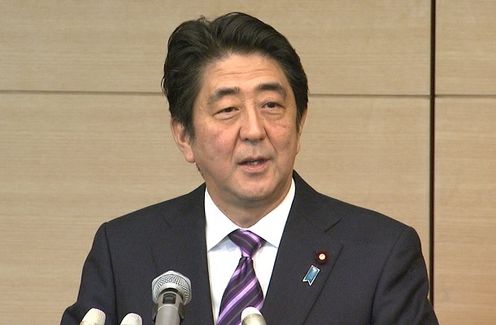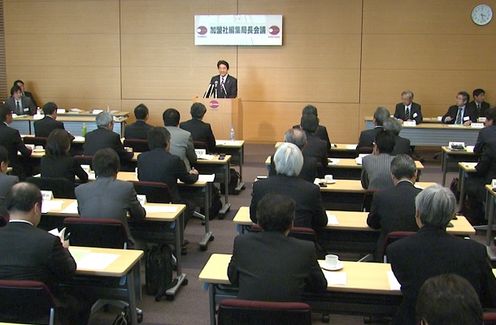Home > News > The Prime Minister in Action > October 2014 > The Prime Minister Attends a Meeting of Managing Editors of the Member Companies of Kyodo News
The Prime Minister Attends a Meeting of Managing Editors of the Member Companies of Kyodo News
Friday, October 24, 2014

Photograph of the Prime Minister delivering an address (1)

Photograph of the Prime Minister delivering an address (2)
Prime Minister Shinzo Abe attended a meeting of managing editors of the member companies of Kyodo News held in Tokyo.
The Prime Minister said in his address,
“This is the third year in a row that I have had the opportunity to address you all in this way.
Two years ago I was still President of an opposition party. The party leaders’ debate took place the following week, the government was dissolved and we recaptured the administration. When I stand in front of you all it reminds me of the general election two years ago.
I myself led the Liberal Democratic Party (LDP) as the party President, and citizens granted the party a parliamentary seat majority. I am constantly aware of that responsibility as I manage the administration from day to day.
This week, two Cabinet members were replaced. I appointed both of them, and I sincerely apologize to citizens for bringing about this situation. However, the one thing I constantly keep in mind is that I must remain firmly committed to the citizens who granted me this responsibility at the general election two years also.
We face significant external policy issues, including revitalizing the economy. In regional economies, the reality remains particularly severe. We also need to pay ample attention to the impact on lifestyles of lifting the consumption tax rate to 8%, as well as rising prices, including gasoline.
A close watch must also be kept on the course of the global economy, which has recently been showing signs of weakness.
In any event, there can be no administrative or political delays. Based more than ever on that resolve, the government and ruling parties must come together and engage in managing the administration with all their strengths and with a greater sense of urgency.
This incident does not mean the end of my advocacy of active participation by women. Conversely, I want to raise that banner even higher.
In order for Japan to stride strongly into the future, it is essential that we encourage active participation by highly-capable women. However, when I look around here today I see there are few women present; hardly any in fact.
Last week, the Cabinet decided on a bill on promoting active participation by women, which was submitted to the Diet. The national government, local governments and enterprises alike have a duty to prepare the stage for active participation by women. Quite simply, it is a bill for encouraging a change in awareness in society overall. Ms. Kamikawa, who until now was Chair of the LDP’s Headquarters for Promoting Active Participation by Women, has joined the Cabinet, and I hope to have her make an all-out effort to realize a society in which women shine.
Alongside active participation by women, the Diet’s biggest theme at present is regional vitalization.
Managing editors of newspapers, who are in the closest contact with their local communities, are gathered here today from regions nationwide, so I view this as a gathering of people who know only too well that regional vitalization is an issue that must be addressed urgently.
Various administrations up to now have taken up regional vitalization as an important issue. It goes back as far as the Comprehensive National Development Plan, and the balanced development of national territory.
However, the challenges local communities are facing are becoming increasingly severe, including population decline, extreme aging of society and depopulation.
I believe the idea that people in Tokyo can set a course and create local communities that are all uniformly alike has reached its a limit. It is the people living in a local community who know what their community’s strengths and requirements are.
These are not things that someone sitting at a desk in Tokyo is going to be able to come up with.
Therefore, rather than the Government deciding on a framework beforehand and ordering regions to conform with it, the Government will support autonomous initiatives by local communities that are driven by their own motivations.
I want to make a major shift from a “Tokyo-centered perspective” to a “local community-centered perspective.” There is criticism that “it will be essential to embark on concrete system reform” and “power is not being decentralized sufficiently.”
Naturally I want to move system reform substantially forward.
However, I believe that in doing so, it is essential to adopt a “local community perspective.”
Decentralization of power has also taken place any number of times in the past. However, if the only authority that is handed over is the authority that government offices in Tokyo deem to be acceptable to transfer to local communities, all that happens is local governments’ clerical duties increase. At the same time, it is not simply a matter of decentralizing power.
Last month, the National Strategic Special Zones were launched in earnest.
One such Zone is Yabu City in Hyogo Prefecture. Yabu City’s population is less than 26,000 people, down by around 4,000 over the past decade. It is quite a significant population decline for a local municipality of around 26,000 to experience a drop of 4,000 people.
Yabu City had been struggling with large areas of vacant agricultural land and depopulation. Faced with that, Mayor Hirose concluded that because the city’s greatest strength is agriculture, it would transform its agriculture into a high-value-added export industry. Driven by Mayor Hirose’s aspirations, Yabu City is striving to improve productivity and to absorb strengths from companies that boast expertise in marketing and exporting into its agricultural industry. In doing so, it ran up against a wall in the form of “the authority of agricultural commissions.” In order to support Mayor Hirose’s aspirations, system reform was carried out to designate Yabu City as a National Strategic Special Zone and transfer agricultural commission authority to the local municipality.
It has been pointed out for many years that agricultural commissions’ decisions take too long. However, if motivated local communities have requests, we view no area as sacred or off-limits.
A Cabinet decision on a bill to amend the Act on National Strategic Special Zones is scheduled to take place soon, and will also include private management of public schools.
This arose out of a meeting I had with Osaka City Mayor Hashimoto in Osaka, in which he passionately told me he wants to take up a fresh challenge by incorporating private-sector dynamism in the education field, for the future of Osaka. There is no doubt that an idea backed up by that much motivation will be sure to capitalize thoroughly on the results of system reform.
Private management of public schools was a challenge that could not be achieved for many years, but we have decided to take up this challenge.
The Abe Cabinet will move boldly ahead with “system reform of local communities, by local communities, and for local communities”.
The same goes for the Government’s support measures. We intend to implement new support measures with a high degree of freedom for motivated local communities.
Under the Democratic Party of Japan, a “one-off subsidy” was implemented, but insofar as the point of contact was the Cabinet Office, in reality the vertically-segmented system of Kasumigaseki, the district where most ministries and agencies are located, remained as it was. It amounted to nothing more than a name-change.
From the municipalities’ perspective, all that happened was procedures became more complicated. I have absolutely no intention of implementing measures like this, which are measures in form only, with no substance.
Neither will I adopt a so-called pork barrel approach of distributing a uniform amount of money irrespective of whether or not local communities are motivated. Local communities will come up with blueprints for their futures and ideas themselves. The Government will not intervene in this in any way, although naturally clerical checks will be made. We will explore a new approach.
Budgets, taxes and system reform. All policy methods will be used freely, and the Abe Cabinet will move the vitalization of local communities ahead using a mindset and approaches of a dimension not seen before.
The reconstruction of Tohoku is also an important issue for the Abe Administration, of course. Since the administration changed, we have been taking determined steps forward. And I believe that rather than rebuild Tohoku, we must build a new Tohoku. New challenges are underway in the field of agriculture and in the field of technology also. As the Government, we also want to solidly support those challenges. In particular, the reconstruction of Fukushima Prefecture has slowed. We will drive the reconstruction forward based on the belief that there can be no revitalization of Tohoku, or of Japan, without the reconstruction of Fukushima.
When all the newspapers of all the member companies gathered here today are combined, it represents a circulation of 30 million. That means more than half the households in Japan read your newspapers. Your influence on society is tremendous.
The efforts of everyone at Kyodo News, from President Fukuyama down, are a significant reason for that. More than anything else, however, you member companies gathered here today compete amongst yourselves to do your utmost for your local communities. This competition and vitality is a result of each of you resolving to make the top stories on your front pages material that is unique to the local community, regardless of what happens in Tokyo. You do not use Kyodo News stories as they are, opting instead to give them a local flavor. That determination is undoubtedly the reason why your newspapers are loved by local communities.
It is my fervent hope that you will distil the overflowing vitality that exists in local communities with your front-line strengths and energize local communities more and more with your pages. I believe the success or failure of the Abe Cabinet’s vitalization of local communities hinges on that. I came here today because I was determined to get this point across. Thank you very much for listening.”

